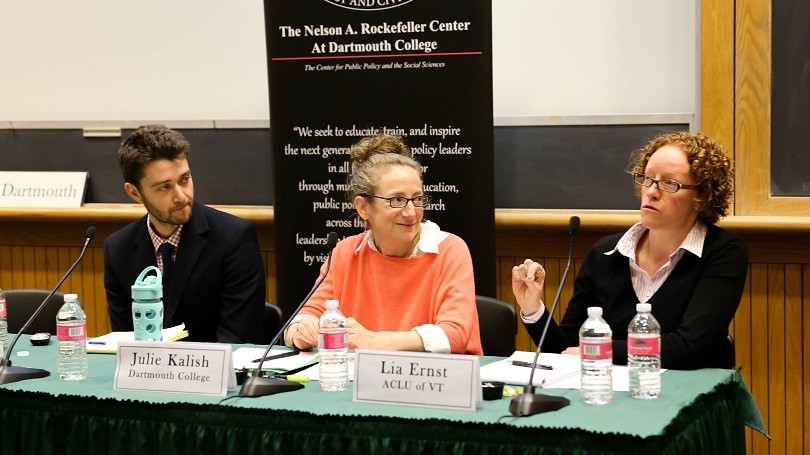
- Public Policy
- Leadership
- Funding
- News & Events
- About the Center
Back to Top Nav
Back to Top Nav
Back to Top Nav
Back to Top Nav
According to the U.S. Bureau of Justice Statistics, the United States had a total correctional population of 6,741,400 people at the end of 2015. Delving deeper into the prison system’s high numbers, we see a disparity in the inmates’ predominant socioeconomic and racial backgrounds. In questioning the social problems such as crime, poverty, prejudice and political corruption, we must also look at the legal system that perpetuates these ideas and systematic issues. The historical and contemporary patterns of inequality are directly influenced by the Constitution and the court. This event will focus on the constitutionality of arrests, trials, and incarceration following crime.
On Monday, February 20, 2017, the Rockefeller Center and Constitutionally Speaking co-sponsored a symposium titled “Crime and the Constitution: Arrest, Trial, Incarceration.” The panelists assessed the reasons behind these inequalities and disparities and addressed constitutional issues that arise in connection with arrests, criminal trials, and incarceration. They also discussed aspects such as racial profiling, race and the jury, and the influence of the rise of private prisons on the judicial system.
The panelists were Derek Epp, a visiting professor and Postdoctoral Research Associate in the Policy Research Shop at the Nelson A. Rockefeller Center, Lia Ernst, the staff attorney of the American Civil Liberties Union of Vermont, and Julie Kalish ’91, a lecturer at Dartmouth’s Institute for Writing and Rhetoric.
Derek Epp is a Postdoctoral Fellow, Visiting Assistant Professor, and Manager, Policy Research Shop at the Nelson A. Rockefeller Center for Public Policy. His research agenda focuses on policy change over time. Working to measure the capacity of institutions to attend to political information and then tracking the division of that attention across issues, Epp assesses to what effect and how long certain issues grab attention for. He also studies criminal justice with a particular focus on racial patterns in police traffic stops.
Lia Ernst has served as a staff attorney for the ACLU of Vermont since 2015. Prior, she served as a judicial law clerk for the U.S. District Court for the Eastern District of Michigan and the U.S. Court of Appeals for the First Circuit, a legal intern at the ACLU of Michigan, and a legal fellow at the ACLU of Massachusetts. Ernst also worked as an an associate attorney for a small Michigan firm focused on criminal defense and attorney ethics.
Julie Kalish teaches a course on the Surpeme Court for the Dartmouth’s Institute for Writing & Rhetoric. She has a particular interest in the First Amendment Speech and Religion clauses, and is doing research on the opinions of Justice Alito. Kalish additionally serves as the Vice President of the Board of Directors for the ACLU of Vermont and works on its Legal Advisory Panel.
The panel was moderated by John Greabe ’85, a constitutional law professor at the University of New Hampshire School of Law. Greabe is also a member of the Dartmouth Legal Studies faculty group. He serves as the Civics Education Outreach Coordinator for the United States District Court, District of New Hampshire and writes a biweekly column on the Constitution for the Concord Monitor. Greabe’s work background focuses on constitutional law, federal courts and procedure, and civil rights litigation. Previously, Greabe taught at Vermont Law School, had a federal appellate practice, and clerked for a number of federal appeals and trial judges within the United States Court of Appeals for the First Circuit.
Submitted by Alexa Green ’19, Rockefeller Center Student Program Assistant for Public Programs
The views and opinions expressed and any materials presented during a public program are the speaker’s own and do not necessarily represent the views and opinions of the Rockefeller Center or constitute an endorsement by the Center.